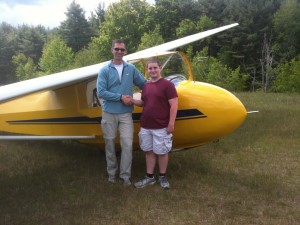Overview
NESA provides its members with primary flight instruction. This means that people with no previous flight experience can learn to fly. We also can instruct those who already hold another FAA certificate but wish to add a glider rating.
 As a non-profit organization, most instruction takes place on weekends and is on a first come, first serve basis. Due to a limited operating schedule, student progression may vary. With a little patience and dedication, receiving instruction with NESA can be the most cost effective way to earn your glider rating. However, if a student wishes to progress at a faster rate, seeking instruction at a commercial glider operation may be preferable.
As a non-profit organization, most instruction takes place on weekends and is on a first come, first serve basis. Due to a limited operating schedule, student progression may vary. With a little patience and dedication, receiving instruction with NESA can be the most cost effective way to earn your glider rating. However, if a student wishes to progress at a faster rate, seeking instruction at a commercial glider operation may be preferable.
Expectations of Student Pilots
Learning to soar requires dedication, commitment to training, patience, and self-discipline; all qualities possessed by good pilots. To get the most out of your instruction, NESA has the following expectations:
- Students must be flexible; soaring conditions may not always be favorable, there may others waiting, or instruction may not be immediately available.
- Students will need to study; in addition to a flight test, obtaining your license requires a written and oral exam. For every hour of flying, you should plan to spend two hours studying. Students should also review any materials assigned by the instructor prior to lessons and ask questions.
- Students should help with club operations. Students who show up to fly and leave afterwards won’t be successful as others who stick around and learn the other aspects of soaring and club operations: how gliders are put away, how they are disassembled and reassembled, wing running, etc.
- Students will need to familiarize themselves with club operating rules. A copy of NESA operating rules is enclosed and available on the club website.
- Students should fly as frequently as possible. Students who minimize the time between lessons progress at a faster rate than those who may fly once or twice a month.
Currently, NESA has 6 FAA-Certified Flight Instructors for Glider (CFIG) who volunteer their time and do not get paid. Instructors are investing their time and it is expected that student pilots make an equal investment.
Interested? Contact us for more information.
